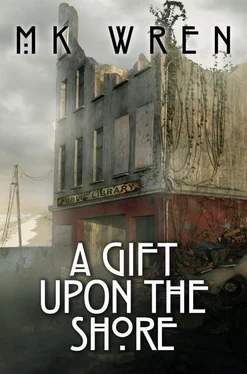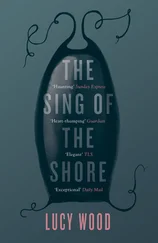I look into his guileless face, the color of bronze, smooth and unlined. “No, Stephen, but we didn’t hesitate to take advantage of their misfortune. We had pledged ourselves to survive. But in the weeks that followed, the year turned to winter, and that only made that unnatural winter worse. We were always cold, always exhausted. Just keeping warm took hours every day, not only tending the fires, but sawing and splitting wood. After we used all our seasoned wood, we had to go out in that foul, dark cold and cut trees. At least, we still had chain saws that worked. And most of the time, we had water in the house, but only trickles. Bathing and laundry became almost too difficult to consider, but as long as we kept fires in the kitchen and bathroom and cleared the ice off the reservoir every day, we managed to keep the plumbing intact. And, as Rachel said, we could be grateful no one ever got around to making toilets electronic.”
Stephen smiles at that, but it fades as I go on. “It was a terrible time, and I always had the feeling that the darkness was the shadow of death. Every night I dreamed of death, dreams that woke me up, left me shaking. I think we might’ve given up if we’d only had ourselves to consider. But we had the animals. We lost two goats and more chickens and rabbits, although we did get a wood stove set up in the garage. And we lost Cyrano, one of our male kittens, but the animals that lived depended on us.”
“And you depended on each other,” he says quietly.
“Yes, that above all. Neither of us could’ve survived alone, and that brought us together in a way I don’t think anyone could understand unless they’d been through a similar ordeal. And finally, we had some hope.”
His lips part expectantly. “What was it?”
“Well, it came on the winter solstice, which seemed fitting. I went out that night with the dogs so they could relieve themselves. Two feet of snow lay on the ground, and the wind was screaming out of the east. I looked up into the sky, expecting to see the same thing I’d seen every night for nearly a hundred nights: absolute darkness. But on that night I saw… the moon.” I smile, remembering the wonder of it. “A full moon, Stephen. It was veiled in dirty clouds, but I could see it. I called Rachel to come out, and we wept and shouted and danced in the snow. Nothing I’ve ever seen in my life was as beautiful as that amber moon.”
“It was like the rainbow, wasn’t it? The rainbow God sent to Noah after the Flood.”
I feel my smile fade. The god that sent the rainbow to Noah, according to the writers of the Pentateuch, sent it as a covenant that the world—their world which was little larger than mine is now—would never again be destroyed by flood. That god did not, it seems, make any promises about not destroying the world by nuclear fire and ice.
“Stephen, what the moon on the winter solstice meant was simply that hope was no longer unreasonable.” I open the diary, and his eyes fix on it avidly. “The first entry in this diary is dated January first of the new year. It begins: ‘Another blizzard today. We haven’t seen the moon again nor even a break in the clouds since the winter solstice.’”
His shoulders slump, and I add: “There was no promise in the moon on the winter solstice. The Long Winter didn’t end then. More of our animals died, including nearly all the hens. Of course, the hens that survived weren’t laying; it was too dark. We were just lucky Josie kept giving milk through the worst of the winter. But it wasn’t until March, I think…” I turn a few pages in the diary. “Here it is. March first. We saw the sun. Briefly and dimly. About the same time we saw a few gulls and crows. I don’t know where they went during the winter, those that lived. South, maybe. I have great respect for crows—even if I’ve cursed them over the years for eating the seeds right out of our garden—but seeing the gulls gave me real hope. I suppose I’m biased toward gulls because they’re so beautiful. The essence of freedom and grace.” Then I smile at Stephen. “That’s rank romanticism. Gulls are hardheaded and birdbrained. But it wasn’t their beauty that made them so welcome to us. The fact that they survived suggested that not all the birds in this part of the world had been destroyed. We lost the sandpipers, you know.”
“What’s a sandpiper?”
I try to explain it to him, my voice husky with memories of those doughty little birds flying over the surf like sparkling schools of fish, and when they fed in the sand, flurrying in and out with the waves like animate foam. I can only hope sandpipers survived on other beaches elsewhere in the world. What’s a world without sandpipers?
I clear my throat and go on. “One reason we were so glad to see the gulls and crows was because they’re such good scavengers. In January and February, we still had violent storms to sweep the beach clean, but by March, there weren’t as many storms, and the debris collected above the high-tide line: dead fish, crabs, jellyfish, kelp by the ton, sea lions, even gray whales. The stink of it—our noses never got used to it.”
He wrinkles his nose. “That must’ve been awful.”
“Yes, it was. The flotsam and jetsam of death. And not just dead animals and seaweed. The storms drove in wrecked boats, broken lumber from houses, even furniture. And sometimes… human remains.” I look down at the diary. “Anyway, the winter wasn’t over for us, but it gradually eased off. In March it warmed up enough to rain instead of snow. But at times the rains were freezing rains, and that cost us some of the trees in the orchard.” I turn more pages. “By late March we had an occasional almost clear day, but all that year the sky had an odd, opalescent cast, and there were always sundogs and halos. The light was reddish gold, the shadows blue green. The sunsets were spectacular. By the first of April, the frogs were singing, and some of the wild plants were showing signs of life, and our bees began foraging for pollen. The winter killed a lot of them, and Rachel consolidated the five hives into three and kept feeding them honey from the year before, but we thought it a miracle that any of them survived.”
I close the book, keeping my place with one finger. “But nothing really flourished. We planted a garden in early May. Outside, I mean. Rachel had seedlings growing in the greenhouse before that. But the outside garden was a continual disaster. There were frosts in May, and we had to start all over. We sowed clover and orchard grass for the livestock, but not much of it took hold. In April we started letting the goats out in the north pasture. It wasn’t fenced then, and we hobbled them so they wouldn’t wander off, and that was a mistake. One day we came home from a scavenging foray in time to see a pack of feral dogs kill one of the kids. We knew then we couldn’t leave them outside our fence without one of us on hand. We’d made our fence fairly dog-proof; added three lines of wire to make it higher. Power line. Makes good fencing, and there was plenty of it around. But we had to let the goats into the north pasture because there just wasn’t enough forage inside our fence. We began taking turns on the scavenging trips, so one of us could serve as shepherd. I don’t know whether it was worse going out alone into that ruined world, or staying home and waiting for Rachel to return, wondering if she would. We still found food in some of the houses, and we collected anything else that might be useful, even some furniture, but that was mostly for the hardwood. One of our projects was making soap—as a pesticide; we still had plenty of soap for our own use—and that took hardwood ashes.”
He asks, “Couldn’t you go up to the Coast Range for big leaf or vine maple like we do?”
Читать дальше












